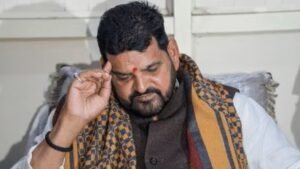Suspension of Wrestling Body of India
In a surprising turn of events, the Wrestling Federation of India (WFI) has found itself under suspension by the Sports Ministry. This decision comes on the heels of the newly-elected body, led by Sanjay Singh, announcing the abrupt organization of U-15 and U-20 nationals without providing adequate notice to the wrestlers. The suspension has raised questions about the adherence to the constitution and the Sports Code, sparking a controversy that needs careful examination.
Elected on December 21:
The suspension follows the WFI elections held on December 21, where Sanjay Singh and his supporters secured significant victories, aligning themselves with former president Brij Bhushan Sharan Singh. However, it appears that the new body has not adhered to the WFI constitution, leading to the Sports Ministry’s decision to suspend all activities until further notice.
Constitutional Violations:
The crux of the matter lies in the alleged violation of the WFI constitution. According to a ministry source, the announcement of the U-15 and U-20 nationals by Sanjay Singh on the day of his election lacked the necessary notice and adherence to constitutional provisions. Clause 3 (e) of the WFI constitution outlines the objectives of the federation, including arranging national championships according to UWW rules and with proper planning. The abrupt announcement without adequate notice seems to have breached these constitutional provisions.
Sports Ministry’s Stand:
A sports ministry official clarified that the suspension does not terminate the federation but is in place until further orders. The official emphasized the need for the new body to follow due process and adhere to the established rules. This stance underscores the importance of upholding the constitution and maintaining transparency in the functioning of sports federations.
Constitutional Requirements for Meetings:
The article delves into the specific constitutional requirements for conducting meetings within the WFI. Article XI of the WFI constitution outlines the notice period and quorum for executive committee (EC) meetings. A minimum notice period of 15 clear days and a quorum of 1/3rd of representatives are mandated. Even for emergency EC meetings, a notice period of 7 clear days and a quorum requirement of 1/3rd of representatives are specified. The apparent lack of adherence to these requirements raises concerns about the legitimacy of the decisions taken by the newly-elected body.
Role of Secretary General:
Article X (d) of the WFI constitution designates the secretary general as the individual responsible for carrying out the general business of the federation. The article highlights that the secretary general appears not to have been involved in the EC meeting where the decisions were made, further emphasizing the potential procedural irregularities within the WFI.
Premises Controversy:
The article explores the contentious issue of the business of the federation being run from premises allegedly controlled by former office bearers. This raises questions about the independence and autonomy of the new body, especially considering the ongoing court proceedings related to allegations of sexual harassment within these premises. The intertwining of administrative decisions with controversial premises adds complexity to the overall situation.
International Implications:
Another crucial aspect of the controversy is the lack of official communication from the United World Wrestling (UWW), the international body for wrestling, regarding the suspension of WFI. The absence of a formal statement from the UWW adds uncertainty to the status of the Indian wrestling federation on the global stage.
Need for Transparency
The suspension of the Wrestling Federation of India highlights a complex web of issues, including constitutional violations, procedural irregularities, and controversies surrounding the federation’s premises. The need for transparency, adherence to the constitution, and international recognition are paramount for the resolution of this controversy. As the wrestling community awaits further developments, it is essential for all stakeholders to prioritize the best interests of the sport and its athletes while navigating through these challenging times.











